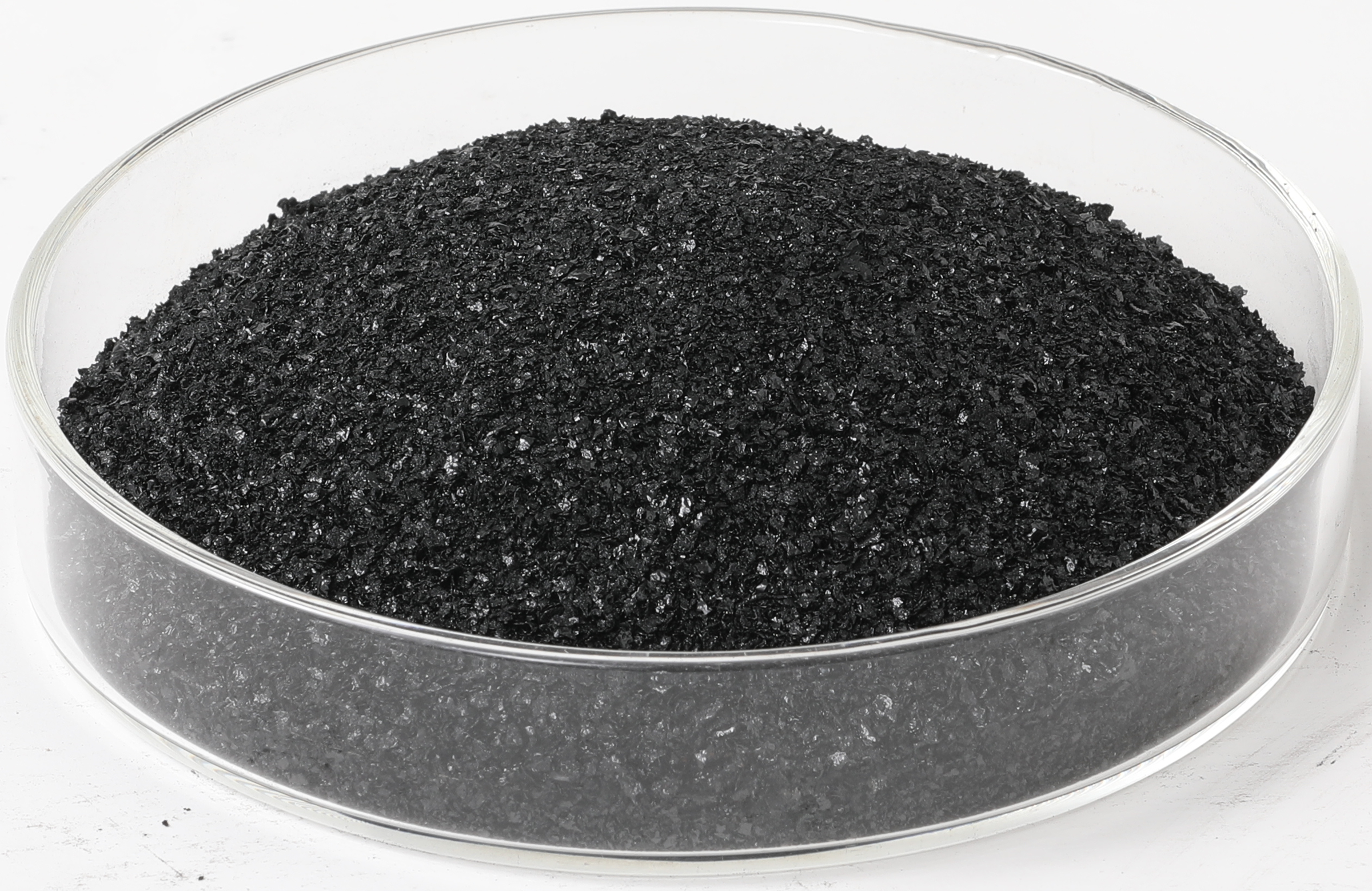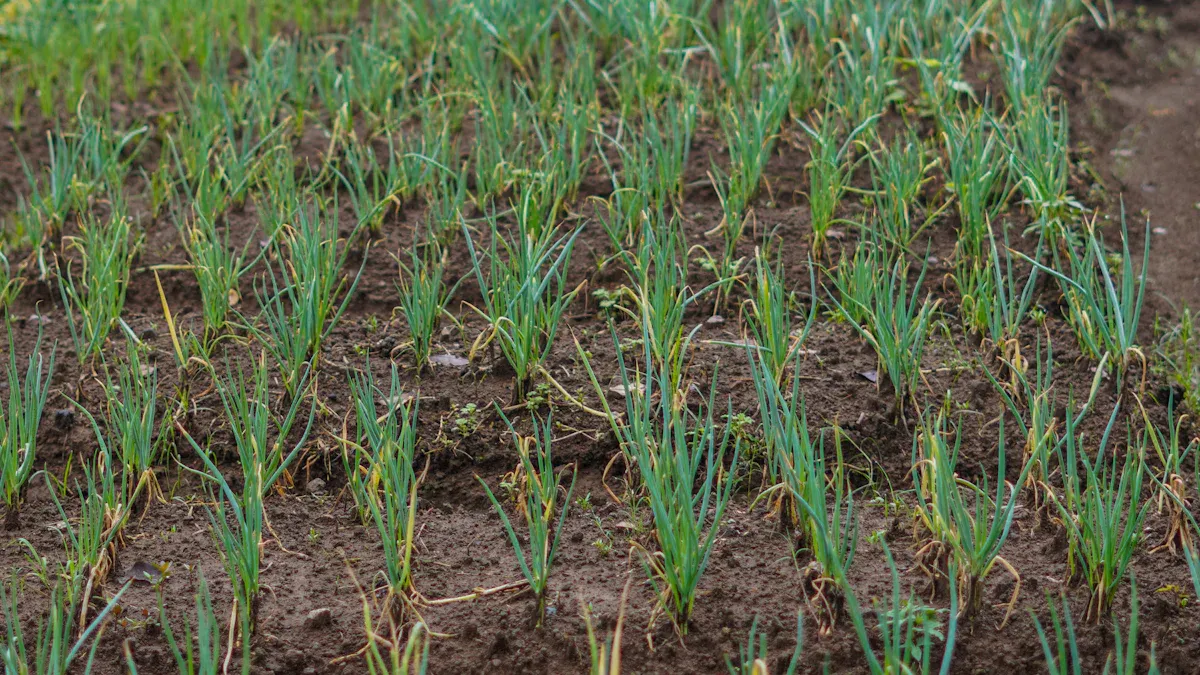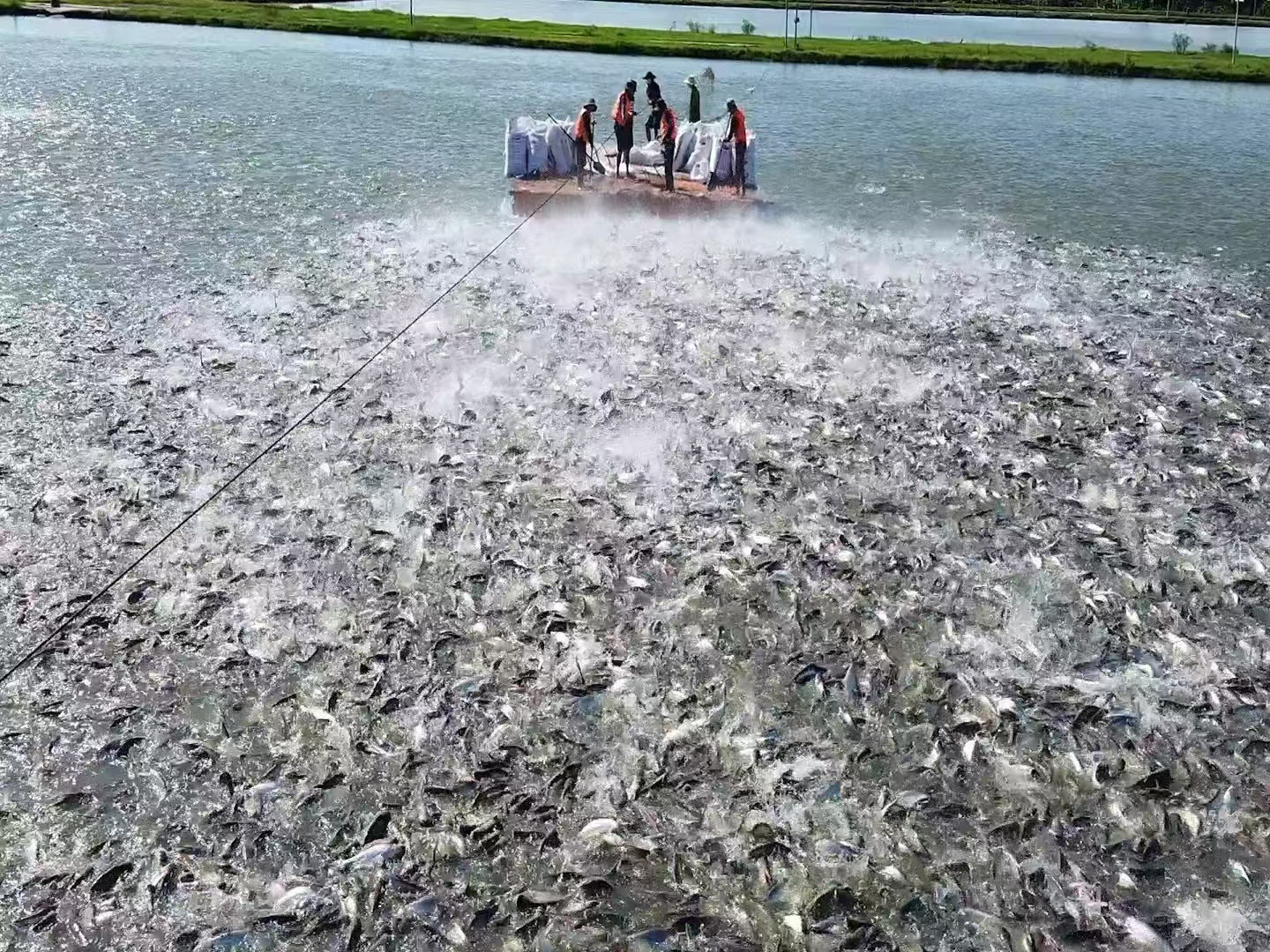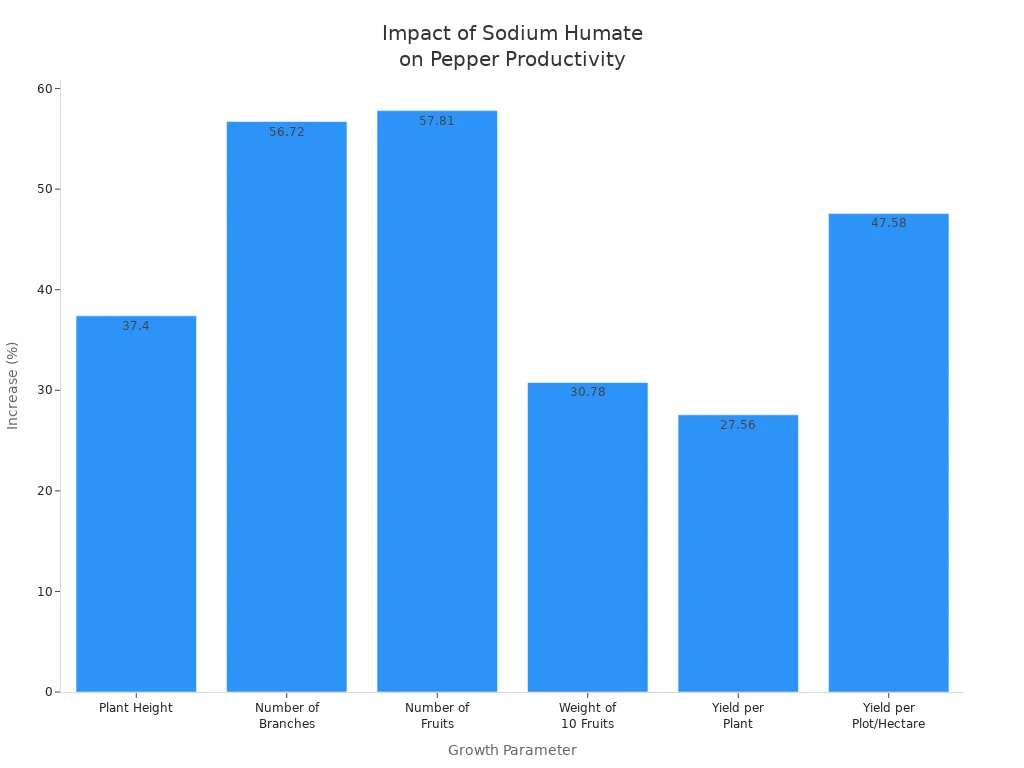Application of sodium humate in Indonesia

Sodium humate is very important in Indonesia. It helps make soil, water, and animals better. Farmers and workers use sodium humate to improve soil and help plants grow. It also helps keep water clean for fish farms. Sodium humate helps animals stay healthy. You can find sodium humate as granules or powder. It comes in 40% and 60% purity grades.
These types help remove toxins from animals. They give animals small nutrients. They help animals absorb minerals better. This keeps animal food safe.
Form of Sodium Humate | Purity Grade | Application Areas |
|---|---|---|
Granules | 40% and 60% | Agriculture, Animal Husbandry, Industry |
Powder | 40% and 60% | Agriculture, Animal Husbandry, Industry |
Humic substances help fix damaged land. They also help keep nature balanced.
Key Takeaways
Sodium humate makes soil stronger and richer. It helps plants grow well and gives more crops.
Mixing sodium humate with fertilizers helps plants use nutrients better. Plants get healthier and give more crops with less chemicals.
In fish and shrimp farms, sodium humate keeps water clean. It balances pH and helps animals grow fast and stay healthy.
Adding sodium humate to animal food helps animals digest better. It helps them grow, make more milk and eggs, and stay strong.
Humic substances stop soil from washing away. They keep water clean and help protect nature and farming.
Farmers using sodium humate get more crops and better animal growth. Their animals eat better, and farmers earn more money.
Problems like high cost, hard-to-find supply, and little training slow down sodium humate use. Teaching and better supply can help more people use it.
Sodium humate has a bright future in Indonesia. More people want it, the government helps, and new technology makes it cheaper and better.
Uses in Agriculture

Sodium humate is very important for farming in Indonesia. Farmers use it to make soil better and help crops grow. It helps farms of all sizes, from big rice fields to small gardens. More people use humate and humic acid now. They want to fix soil and grow more food.
Soil Conditioner
Structure Improvement
Humic acid and humate products help soil become stronger. They stick soil pieces together to make stable clumps. This helps air and water move through the soil. Good soil lets roots grow deeper and get more food. Many soils in Indonesia are packed tight or weak. This happens because of too much fertilizer or old plantations. Adding humic acid and humate can fix some of these problems.
Humic acid adds more carbon and makes soil clumps stronger.
Potassium humate helps soil clumps stay together and lets air in.
Humic substances help soil hold water, which helps in dry times.
Soil with humic acid keeps more nutrients for plants.
These changes help plants grow well and give more crops.
Fertility Enhancement
Sodium humate and humic acid make soil richer in many ways. They give food and nutrients to tiny living things in the soil. These tiny things break down old plants and give food to new ones. Humic acid also helps balance soil pH. This makes sour soil less harsh and helps crops grow.
Sodium humate helps good bacteria make nitrogen for plants.
Humic acid helps plants get more copper, zinc, iron, and manganese.
Humic acid makes enzymes work better in the soil.
Tiny living things in the soil become more active with humic acid.
These changes help plants take in more food and grow stronger. Farmers in Indonesia see better crops like rice, corn, and mung beans when they use humic acid and humate.
Fertilizer Additive
Farmers mix sodium humate with chemical fertilizers to make them work better. Humic acid helps plants use nutrients from fertilizers. Crops can take in more nitrogen, phosphorus, and potassium. This means farmers get more crops with the same or less fertilizer.
Sodium humate helps crops like vegetables, tea, and tubers get more food. It keeps nutrients near the roots and stops them from washing away. Potassium humate also helps roots grow and keeps plants from getting stressed. These things make plants stronger and crops more steady.
Tip: Mixing humic acid or humate with NPK fertilizer can help rice plants grow taller, have more stems, longer flower clusters, and more grains than using NPK alone.
Horticulture and Gardening
People who garden or grow flowers in Indonesia also use humic acid and humate. These products make soil better in flower beds, vegetable gardens, and fruit orchards. Humic acid helps soil keep water, which is good for potted plants and gardens when it is dry.
Humic acid and humate help roots grow well in flowers and vegetables.
They help plants get better after moving or stress.
Gardeners use humic acid to help tomatoes, peppers, and leafy greens grow more.
Rehabilitating Critical Soils and Former Plantation Lands
Indonesia has problems with bad soil, especially where there was mining or old plantations. Humic acid and humate mixed with compost help fix these lands. They make soil hold more nutrients and help new plants grow. More phosphorus and better soil help bring plants back.
Farmers and land managers use humic substances to fix damaged soil. These actions help turn empty or ruined land into useful farms again. This helps people have more food and keeps nature healthy.
Aquaculture Applications

Sodium humate is important in fish and shrimp farming in Indonesia. Farmers use it to make water better and keep ponds safe. It helps shrimp and fish grow faster and healthier. Both small and big farms use sodium humate.
Water Quality
Clean water is needed for healthy shrimp and fish. Sodium humate helps clean water by taking out bad things. It sticks to harmful stuff and heavy metals. This makes the water safer for animals. It also lowers ammonia nitrogen, which can hurt shrimp and fish.
Scientists saw that sodium humate helps shrimp live longer and grow bigger. The table below shows what happens when shrimp get sodium humate or sodium humate with probiotics:
Parameter | Effect of Sodium Humate (SH) and SH with Probiotics on Litopenaeus vannamei |
|---|---|
Survival Rate (SR) | SH group: 88.44% (higher than control); SH + Probiotics: 86.07% |
Final Body Weight & SGR | Higher in SH and SH + Probiotics groups |
Feed Conversion Rate (FCR) | Lower in SH and SH + Probiotics groups |
Ammonia Nitrogen Concentration | Lower in SH + Probiotics group on day 15 |
Enzyme Activities | Higher in SH group |
Antioxidant Enzymes | Higher in SH group; some higher in SH + Probiotics group |
Water Quality Improvement | SH adsorbs pollutants, chelates metals, reduces ammonia nitrogen |
The table shows sodium humate makes water cleaner and shrimp grow better. Farmers see stronger animals and ponds that stay healthy.
pH Stabilization
Keeping pH steady is important for ponds. If pH changes too fast, shrimp and fish can get sick. Sodium humate helps keep pH at a safe level. After using it, water pH goes down a little but stays safe. Soil pH also stays steady. This means sodium humate helps keep ponds balanced.
Note: Sodium humate keeps pH steady. This helps shrimp and fish feel less stress and grow better.
Feed Efficiency
Farmers want shrimp and fish to grow well with less food. Sodium humate helps animals use food better. It makes their digestive enzymes work harder. Shrimp and fish get more from each meal. Farmers can use less feed and still get good growth.
Better feed use saves money and keeps water cleaner. Healthier animals get sick less and grow faster. Many fish and shrimp farms in Indonesia use sodium humate for these reasons.
Animal Husbandry
Sodium humate is very important for animal farming in Indonesia. Farmers use it in animal food to help animals grow and stay healthy. It helps chickens, cows, goats, and fish get better nutrition. Animals eat food with sodium humate and digest it more easily. This makes them grow faster and stay healthier.
Feed Additive
Poultry
Farmers add sodium humate to chicken and duck food. Birds eat this food and get more nutrients. They grow bigger and lay more eggs. Sodium humate helps birds fight sickness and keeps their feathers shiny. Birds become stronger and do not get sick as often. Eggs have more protein and stronger shells. The food for birds is more balanced.
Cattle and Livestock
Cows and goats get sodium humate in their food. This helps them digest grass and grains better. Cows make more milk and the milk is better. Farmers see cows and goats with steady blood sugar. This keeps them healthy and lowers the chance of diabetes. Animals gain weight faster and grow better. Goats also make more milk. Sodium humate helps animals stay healthy and not get sick.
Benefit | Cattle | Goats |
|---|---|---|
Feed efficiency | Improved | Improved |
Milk yield | Higher | Higher |
Milk production | Increased | Increased |
Blood glucose levels | More stable | More stable |
Digestibility | Enhanced | Enhanced |
Growth | Faster | Faster |
Health | Better | Better |
Farmers use sodium humate to help cows and goats digest fiber. It helps them absorb minerals and get more from their food. Animals get more milk and stay healthy.
Aquatic Species
Fish and shrimp farmers use sodium humate in animal food. Fish and shrimp eat better and grow faster. They stay healthy and fight sickness better. More fish and shrimp live longer. Animals digest food better and get more nutrients. Farmers see more growth and better results in ponds.
Growth and Health
Sodium humate helps animals grow and stay healthy. Animals that eat it get these benefits:
Better feed use and easier digestion
More nutrients from food
Bigger appetite and faster weight gain
More milk and better milk quality
Steady blood sugar and less chance of diabetes
Faster healing and stronger against sickness
Farmers in Indonesia trust sodium humate for their animals. It helps cows, goats, chickens, and fish grow well. Animals stay healthy all their lives. Sodium humate makes animal food better and helps farmers get more value from their animals.
Environmental Impact
Soil Erosion Control
Soil erosion is a big problem for farmers. Heavy rain and wind wash away topsoil. This makes land less rich and harder to use. Humic acid helps soil stick together. It forms clumps that stop erosion. Farmers who use humic acid lose less soil. They see stronger soil and better roots. Humic substances help water soak into the ground. This means less runoff and soil stays put.
Farmers in Java and Sumatra use humic acid on hills. They see fewer landslides and better crops.
A table below shows how humic acid helps stop erosion:
Benefit | Result |
|---|---|
Stronger soil clumps | Less soil loss |
Better water holding | Less runoff |
Healthier roots | More stable plants |
Water Pollution Reduction
Water pollution hurts rivers, ponds, and lakes. Farms and factories can put bad chemicals in water. Humic acid works like a natural filter. It grabs heavy metals and toxins. This keeps dangerous stuff out of water. Fish farmers use humic acid to keep ponds clean. They see fewer sick fish and better water. Humic substances help break down waste in water. This makes water safer for people and animals.
Humic acid removes ammonia and other bad chemicals.
Humic substances lower the chance of algae blooms.
Fish and shrimp grow better in clean water.
Humate products help keep rivers and ponds clean. They protect nature and people's health.
Eco-Friendly Properties
Humic acid and humate are good for the environment. These products come from nature. They break down safely in soil and water. Farmers use humic acid to use less chemical fertilizer. This lowers pollution and saves money. Humic substances make soil healthy without hurting nature. They help farms stay green and keep ecosystems healthy.
Using humic acid and humate helps Indonesia farm in a greener way. These products protect land, water, and animals.
Some eco-friendly benefits are:
Natural source and safe breakdown
Less chemical use on farms
Help for soil and water health
Humic acid and humate help protect Indonesia’s environment. They help farmers grow more food and care for the land.
Sodium Humate Benefits
Productivity Gains
Farmers in Indonesia see big changes after using sodium humate. Crops and animals do better with this humic supplement. It makes soil richer and helps plants use nutrients well. Rice, corn, and vegetables grow more when humic acid and humate are in the soil. Farmers with cows and goats get more milk and faster growth. Humic acid helps animals use food better, so they get more nutrients. Chickens and fish also get stronger and produce more with humate.
A table below shows how humic supplements help farms:
Benefit | Crop Yield | Milk Yield | Animal Growth | Feed Efficiency |
|---|---|---|---|---|
With Humic Supplement | Higher | Increased | Faster | Improved |
Without Supplement | Lower | Reduced | Slower | Less Efficient |
Farmers see that humic acid and humate keep blood sugar steady in animals. This helps animals stay healthy and lowers the chance of diabetes. Sodium humate in animal food can help control blood sugar and keep animals healthy.
Economic Value
Sodium humate helps farmers make more money in Indonesia. More crops and milk mean bigger profits for farmers. The cost of humic acid and humate is balanced by better results and less need for chemical fertilizers. Farmers with cows and goats see more milk and healthier animals. This means less money spent on vets and higher prices at markets.
Farmers who use humic acid and humate waste less food and get steady results. This helps them plan their money better and keep income stable.
Fish and shrimp farms also get more value from sodium humate. Cleaner water and better feed use mean more shrimp and fish. Farms that use these methods can sell at higher prices. Sodium humate also helps stop losses from animal diabetes, so farms make more money.
Sustainability
New studies show sodium humate helps farms and nature in Indonesia. It comes from nature and helps farms stay green. Humic acid and humate make soil healthy and help plants use nutrients. Farmers use these to fix bad land, keep water in the soil, and trap harmful metals. These steps help Indonesia reach its goals for healthy land and nature.
Governments in Southeast Asia give rewards to farmers who use humic supplements. New technology makes humate easier to use and better for farms. Farmers who use sodium humate use fewer chemicals, keep water clean, and help animals stay healthy. This also helps stop diabetes in animals and keeps farms working well.
Using humic acid and humate helps Indonesia farm in a greener way. These supplements help animals stay healthy and fix the environment.
Sodium humate is important for sustainable farming. It helps farmers grow more crops, get more milk, and keep animals healthy while caring for the land.
Challenges and Future
Adoption Barriers
Farmers in Indonesia face many problems when using sodium humate. Small farmers see that humic acid fertilizers cost more than synthetic ones. These fertilizers can be 40–60% more expensive for each hectare. This makes them hard to buy for farmers with little money. Most subsidy programs help synthetic fertilizers. This means organic choices like sodium humate are less popular. In rural areas, it is hard to get sodium humate because distribution is poor. Storage places are also missing in these areas.
Many farmers do not know how to use sodium humate the right way. They need more training to get good results. Small farmers worry about losing crops and money if new products do not work fast. Some policies make it harder for organic farmers by giving higher loan rates. Humic acid fertilizers show slow results, so farmers and lenders lose trust.
Note: Teaching farmers more about sodium humate can help solve these problems and build trust.
Main barriers include:
Higher prices than synthetic fertilizers
Subsidies help non-organic products more
Poor distribution and storage in villages
Not enough training for farmers
Fear of losing crops and money
Policies that do not help organic farming
Slow results from humic acid fertilizers
Supply and Quality
Supply and quality problems also affect sodium humate in Indonesia. High costs to make it stop small farmers from buying it. Prices for raw materials change often and make the market unstable. Some suppliers cannot keep product quality the same. This makes it hard for farmers to trust and use sodium humate. No standard rules mean farmers get products that work differently.
Not enough people know about sodium humate and its benefits. Farmers need better information and cheaper ways to use it. More education and better supply chains can help fix these issues.
Challenge | Impact on Market |
|---|---|
High production costs | Harder for farmers to buy |
Raw material changes | Makes market unstable |
Quality not consistent | Farmers lose trust |
No standard rules | Hard to use and trust |
Low awareness | Slows down market growth |
Trends and Innovation
The future for sodium humate in Indonesia looks good. The Asia Pacific area leads the world in humic acid market growth. More farming and interest in organic food make demand go up. Governments help farmers use humic acid products for better farming.
Experts think the humic acid market will grow 7.01% each year from 2025 to 2030. By 2030, the market could be worth over USD 1 billion. People want more organic food, better soil, and cleaner land. Sodium humate helps soil get more air, hold water, and grow roots. These things help fight soil damage and loss of nutrients, which are big problems in Indonesia.
Tip: New ways to lower costs and teach farmers will help sodium humate reach more people and be used more.
Future prospects:
Fast market growth in Asia Pacific
Help from government policies
More people want organic and green farming
New technology to lower costs and make products better
More care for soil health and nature
Sodium humate will become more important in Indonesia as more people learn about it and supply problems get fixed.
Sodium humate helps farming, fish farming, and animal care in Indonesia. It makes soil, water, and animals healthier. Farmers get more crops and better soil. The table below shows how sodium humate helps:
Parameter | Effect of Sodium Humate Application |
|---|---|
Cation Exchange Capacity (CEC) | Increased |
Potassium Leaching Rate | Decreased to 0% |
Plant Height | Increased by 37.40% |
Number of Branches | Increased by 56.72% |
Number of Fruits | Increased by 57.81% |
Weight of 10 Fruits | Increased by 30.78% (at 10 mL/L concentration) |
Yield per Plant | Increased by 27.56% (at 10 mL/L concentration) |
Yield per Plot and per Hectare | Increased by 47.58% (at 10 mL/L concentration) |

Indonesia needs to help more farmers use sodium humate. The country should fix problems with supply, price, and teaching people. This will help protect nature and help more farmers.
FAQ
What is sodium humate?
Sodium humate is made from humic substances. Farmers use it to help soil, water, and animals. It comes as powder or granules. It helps crops grow more and animals get bigger.
How do Indonesian farmers apply sodium humate?
Farmers mix sodium humate with water or fertilizer. They spray it on soil or add it to irrigation. Sometimes, they mix it into animal feed. The amount used depends on the crop, soil, or animal.
Is sodium humate safe for the environment?
Yes, sodium humate is safe for nature. It comes from natural sources and breaks down in soil and water. It helps farmers use fewer chemical fertilizers. It protects rivers, ponds, and farmland.
Can sodium humate help restore damaged land?
Sodium humate helps fix bad soils. It makes soil structure and fertility better. Land managers use it to fix old plantations and mining sites. It also helps areas with poor soil health.
What crops benefit most from sodium humate?
Rice, corn, vegetables, and fruit crops do well. Farmers see more crops, stronger roots, and healthier plants. Sodium humate helps these crops grow better.
Does sodium humate improve animal health?
Yes, sodium humate helps animals stay healthy. It helps animals digest food and boosts their immunity. Animals grow faster and get stronger. Farmers see more milk from cows and stronger poultry and fish.
Where can farmers buy sodium humate in Indonesia?
Farmers can buy sodium humate at farm supply stores. Local distributors also sell it. Some cooperatives and online shops offer different purity grades.
What is the recommended dosage for sodium humate?
The amount depends on how it is used. For soil, farmers use 5–10 kg per hectare. For animal feed, the rate changes by species. Farmers should follow instructions or ask an expert.
See Also
Exploring The Uses Of Sodium Humate Throughout Vietnam
Reasons Vietnamese Firms Bring In Sodium Humate For Aquaculture
How Sodium Humate Supports Growth In Agriculture And Industry
